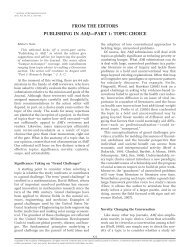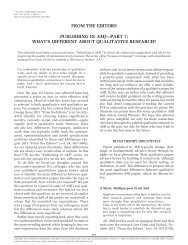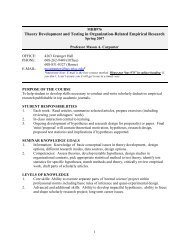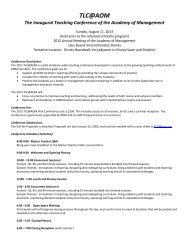inductive reasoning and the creation and justification of new ventures
inductive reasoning and the creation and justification of new ventures
inductive reasoning and the creation and justification of new ventures
You also want an ePaper? Increase the reach of your titles
YUMPU automatically turns print PDFs into web optimized ePapers that Google loves.
2010 Cornelissen <strong>and</strong> Clarke<br />
551<br />
default or prototypical member <strong>of</strong> an existing<br />
category or domain <strong>of</strong> underst<strong>and</strong>ing. This argument<br />
is akin to Glucksberg, McGlone, <strong>and</strong><br />
Manfredi’s (1997) account <strong>of</strong> analogies <strong>and</strong> metaphors<br />
as category-inclusion statements in<br />
which a <strong>new</strong> venture such as Magic is positioned<br />
as a central or prototypical instance <strong>of</strong><br />
novel, ad hoc constructed categories, such as<br />
online shopping (Gentner et al., 2001). With such<br />
category-inclusion statements, potential categories<br />
are generated or invoked from <strong>the</strong> source <strong>of</strong><br />
<strong>the</strong> comparison (e.g., <strong>of</strong>fline shopping) while<br />
sets <strong>of</strong> modifiable dimensions are simultaneously<br />
identified in <strong>the</strong> topic (e.g., self-service<br />
shopping on <strong>the</strong> web). The interpretation <strong>of</strong> <strong>the</strong><br />
legitimacy <strong>of</strong> <strong>the</strong> analogy or metaphor, thus, is a<br />
kind <strong>of</strong> negotiation between <strong>the</strong> category <strong>of</strong> underst<strong>and</strong>ing<br />
prototypically associated with <strong>the</strong><br />
source <strong>and</strong> <strong>the</strong> dimensions <strong>of</strong> <strong>the</strong> described target.<br />
If <strong>the</strong> target is indeed judged by stakeholders to be<br />
a prototypical member <strong>of</strong> <strong>the</strong> ad hoc constituted<br />
category (i.e., online shopping), <strong>the</strong>n <strong>the</strong> comparison<br />
is more likely to confer legitimacy.<br />
The foregoing discussion leads to <strong>the</strong> following<br />
general propositions regarding <strong>the</strong> mediating<br />
influence <strong>of</strong> uncertainty <strong>and</strong> legitimacy on<br />
entrepreneurial sensemaking in interactions<br />
with stakeholders. Analogies <strong>and</strong> metaphors<br />
are reinforced, adapted, or replaced until uncertainty<br />
about <strong>the</strong> venture’s predictability is satisfied<br />
<strong>and</strong> cognitive legitimacy is attained, at<br />
which point <strong>the</strong> motivation diminishes.<br />
Proposition 4: The degree <strong>of</strong> uncertainty<br />
regarding <strong>the</strong> predictability <strong>of</strong><br />
a venture in an industry mediates <strong>the</strong><br />
likelihood that entrepreneurs will rely<br />
on <strong>the</strong>ir initial analogies or metaphors<br />
when speaking to o<strong>the</strong>rs. A high level<br />
<strong>of</strong> uncertainty is associated with an<br />
adaptation or replacement—<strong>and</strong> a<br />
low level <strong>of</strong> uncertainty with a reinforcement—<strong>of</strong><br />
<strong>the</strong>se initial analogies<br />
or metaphors.<br />
Proposition 5: The degree <strong>of</strong> cognitive<br />
legitimacy <strong>of</strong> a venture in an industry<br />
mediates <strong>the</strong> likelihood that entrepreneurs<br />
will rely on <strong>the</strong>ir initial analogies<br />
or metaphors when speaking to<br />
o<strong>the</strong>rs. A low level <strong>of</strong> legitimacy is<br />
associated with an adaptation or replacement—<strong>and</strong><br />
a high level <strong>of</strong> legitimacy<br />
with a reinforcement—<strong>of</strong> <strong>the</strong>ir<br />
initial analogies or metaphors.<br />
DISCUSSION<br />
In this article we have elaborated a process<br />
<strong>the</strong>ory <strong>of</strong> <strong>new</strong> venture <strong>creation</strong> that highlights<br />
<strong>the</strong> role <strong>of</strong> entrepreneurs’ sensemaking to <strong>the</strong>mselves<br />
<strong>and</strong> to o<strong>the</strong>rs whose underst<strong>and</strong>ing <strong>and</strong><br />
support are critical to a venture’s success. We<br />
have argued that in <strong>the</strong> absence <strong>of</strong> a performance<br />
trajectory, entrepreneurs rely on <strong>inductive</strong><br />
(analogical or metaphorical) <strong>reasoning</strong> to<br />
create <strong>and</strong> justify a rationale for a novel venture<br />
that accounts for its existence <strong>and</strong> garners <strong>the</strong><br />
necessary support from relevant stakeholders<br />
<strong>and</strong> resource providers. We next discuss <strong>the</strong><br />
implications for <strong>the</strong>ory <strong>and</strong> research on entrepreneurship,<br />
sensemaking, <strong>and</strong> <strong>new</strong> venture<br />
<strong>creation</strong>.<br />
Contributions <strong>and</strong> Implications<br />
First, we believe this article illustrates <strong>the</strong><br />
significant potential that exists for a focus on<br />
sensemaking (Taylor & Van Every, 2000; Weick<br />
et al., 2005) to contribute to existing <strong>the</strong>ories <strong>and</strong><br />
concerns within entrepreneurship research. To<br />
date, research on entrepreneurial cognition <strong>and</strong><br />
research on <strong>the</strong> institutionalization <strong>of</strong> novel <strong>ventures</strong><br />
have tended to remain relatively selfreferential<br />
(e.g., Alvarez & Barney, 2007), with a<br />
significant gap between <strong>the</strong>m as a result <strong>of</strong> <strong>the</strong><br />
ra<strong>the</strong>r different scholarly traditions <strong>and</strong> methods<br />
associated with positivist psychology <strong>and</strong><br />
interpretive sociology (e.g., DiMaggio, 1997). Although<br />
this may have been necessary for each<br />
<strong>of</strong> <strong>the</strong>se research streams to develop a strong set<br />
<strong>of</strong> <strong>the</strong>oretical <strong>and</strong> methodological principles<br />
(e.g., Baron & Ward, 2004; Mitchell et al., 2002),<br />
we believe that it is time to integrate <strong>the</strong>ir insights<br />
into a more comprehensive <strong>and</strong> processual<br />
underst<strong>and</strong>ing <strong>of</strong> how entrepreneurs develop<br />
<strong>and</strong> explore ideas for a novel venture,<br />
plan <strong>and</strong> launch <strong>the</strong>ir <strong>ventures</strong>, <strong>and</strong> seek to acquire<br />
support <strong>and</strong> legitimacy to sustain <strong>and</strong><br />
grow <strong>the</strong>se <strong>ventures</strong> over time.<br />
The sensemaking approach that we have<br />
elaborated in this paper focuses on how entrepreneurs,<br />
while speaking, construct meaning<br />
about novel <strong>ventures</strong> for <strong>the</strong>mselves <strong>and</strong> o<strong>the</strong>rs<br />
in <strong>the</strong> early stages <strong>of</strong> <strong>the</strong> venture <strong>creation</strong> process.<br />
This particular approach provides a fertile










